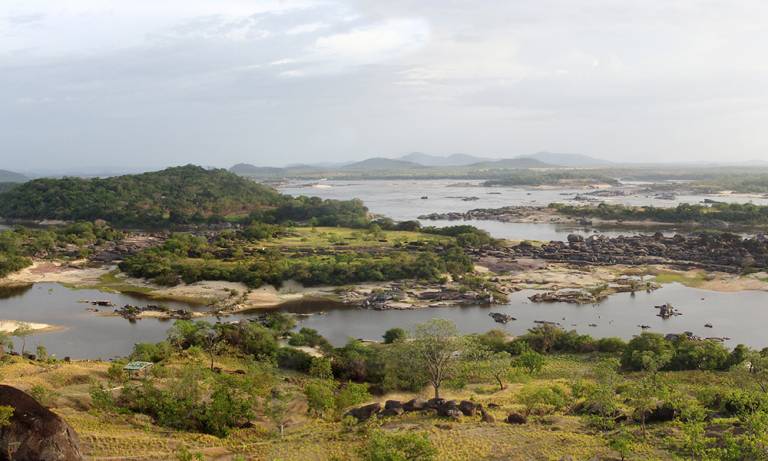The UCL Institute of Archaeology undertakes a wide range of research projects addressing past and current concerns about environmental fragility and the origins of anthropogenic climate change.

Institute staff engage in the broadest spectrum of methods for studying prehistoric and historic landscapes including palaeoenvironmental studies, GlS, large-scale field survey/excavation, phenomenology and anthropological studies. Multi-period field projects include the study of whole islands – Easter Island, Greek islands, and major regional surveys in Iraq, Turkmenistan, Turkey, southern Italy, as well as period specific studies including the Bronze Age Knossos, and British medieval landscapes.
Institute staff undertake research on the evolution of cultivation and anthropogenic soils; on impacts of natural coastal change; on hydrology and salinization, and societal resilience; on social institutions for water management and on long-term human landscape use in fragile environments. Staff work to develop our understanding of risk perception and resilience, and advance our investigation of the origins of anthropogenic climate change. The Institute has dedicated geoarchaeological and GIS laboratory facilities supporting these research areas.
Projects
Current projects
- Ancient Maya Dark Earths
- Arabian Prehistory
- The Archaeology of the Western Isles (Outer Hebrides)
- Boncuklu Hoyuk Project
- Boxgrove Project
- Buddhist monasteries and monasticism in ancient India
- Colonization and connectivity in tropical Wallacea and Sahul
- Conquest, Ecology and Economy in Islamic North Africa: The Example of the Central Medjerda Valley (ISLAMAFR)
- East African coastal caves
- Environmental archaeology in Norway
- Environmental Ethics in Ancient India
- From correlations to explanations: towards a new European prehistory (COREX)
- Human Mobility and long-term social change in the west Mediterranean: Vera Region, Almeria, Spain
- Indus Geomorphology
- The Knossos Urban Landscape Project
- Landscape, Water and Religion in Ancient India
- Landscapes of Governance
- Modern implications of past resource use, disposal, abandonment and decay
- PALAEOTHAW: Unlocking records of past permafrost thaw through isotopes of fossil bones
- PARINÃ - Memorialising Ancestral Landscapes of the Brazilian Northwest Amazon
- Peshdar Plain Project
- Prehistoric hunting strategies in Jordan
- Quaternary Archaeology and Environments of Jersey
- Ramtek Survey
- Rapa Nui Landscapes of Construction
- Re-thinking the Green Revolution in the Medieval Western Mediterranean (6th - 16th centuries) (MEDGREENREV)
- Sanchi Survey Project
- Sensing the Iron Age and Roman Past
- Social Perceptions, Water Use and Climate Change
- UCL Anthropocene
- Upper Esino Valley Survey
- Valdoe Survey
- The Violet Bank Survey: Capturing Fragile Intertidal Prehistory at Scale
Recent projects
- Antikythera Survey Project
- Azraq Project, Jordan
- Beyond the Burghal Hidage
- BigPicnic
- Comparative Models of Megalithic Landscapes in Neolithic Atlantic Europe (MegaScapes)
- Comparative Pathways to Agriculture (ComPAg)
- Cultural Evolution of Neolithic Europe (EUROEVOL)
- Early Rice Project
- The Early Medieval Maritime Landscape of Mersea Island
- Heritage Futures
- The Impact of Evolving of Rice Systems from China to Southeast Asia
- Interrogating archaeological data for climatic information
- Lordship and Landscape in East Anglia CE 400-800
- ORACEAF: The Origins of the Acheulean in East Africa
- Qadisha Valley Project, Lebanon
- Restricted Access Pilot Project
- Salinisation in Mesopotamia
- Shahrizor Research Project
- SHULGI: A Geospatial Tool for Modelling Human Movement and Interaction
- Transmission of innovations: comparing and modelling the spread of farming practices in Europe (EUROFARM)
- Travel and communication in Anglo-Saxon England
- UCL Pesticides and Urban Nature Project
 Close
Close

